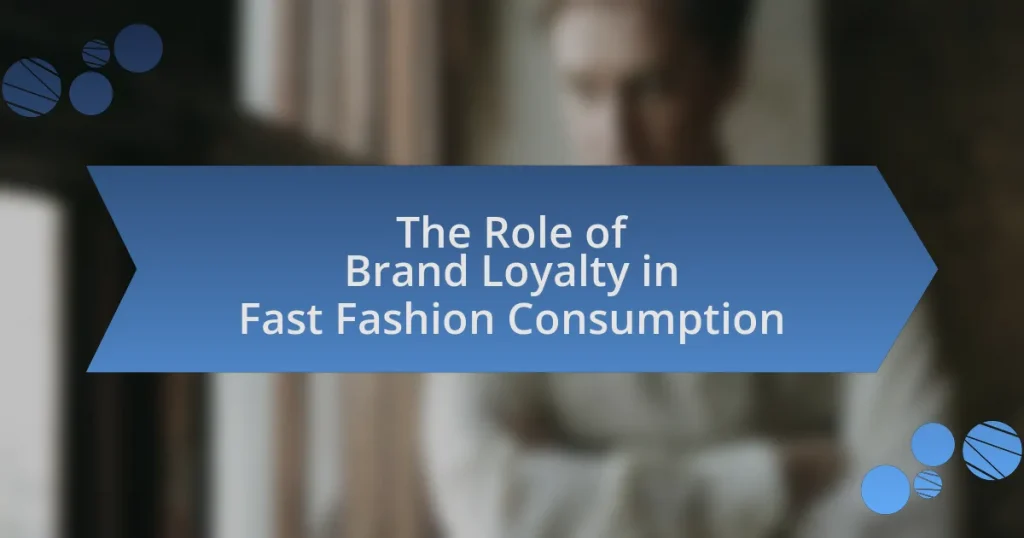Brand loyalty plays a crucial role in fast fashion consumption by driving repeat purchases and fostering emotional connections between consumers and brands. This article explores how brand loyalty influences consumer behavior, purchasing decisions, and customer retention in the fast fashion industry. It examines the psychological factors that contribute to brand loyalty, such as emotional attachment and perceived value, and highlights the competitive advantages it provides to retailers. Additionally, the article addresses the challenges fast fashion brands face in maintaining loyalty amid growing consumer awareness of sustainability issues and offers strategies for enhancing brand loyalty through personalized marketing and social media engagement.

What is the Role of Brand Loyalty in Fast Fashion Consumption?
Brand loyalty significantly influences fast fashion consumption by driving repeat purchases and fostering emotional connections between consumers and brands. This loyalty is cultivated through consistent brand messaging, perceived value, and the alignment of brand identity with consumer values, such as sustainability or trendiness. Research indicates that loyal customers are more likely to overlook price increases and are less sensitive to competitors, as evidenced by a study published in the Journal of Fashion Marketing and Management, which found that brand loyalty can increase customer retention rates by up to 30%. Thus, brand loyalty not only enhances consumer commitment but also contributes to the overall profitability of fast fashion retailers.
How does brand loyalty influence consumer behavior in fast fashion?
Brand loyalty significantly influences consumer behavior in fast fashion by driving repeat purchases and fostering emotional connections with brands. Consumers who exhibit brand loyalty are more likely to choose familiar brands over competitors, often prioritizing them even when faced with higher prices or alternative options. Research indicates that loyal customers contribute to approximately 80% of a brand’s revenue, highlighting the economic impact of brand loyalty in this sector. Additionally, brand loyalty in fast fashion is often reinforced through marketing strategies that emphasize exclusivity and trend alignment, further solidifying consumer preferences and behaviors.
What psychological factors contribute to brand loyalty in fast fashion?
Psychological factors that contribute to brand loyalty in fast fashion include emotional attachment, social identity, and perceived value. Emotional attachment arises when consumers develop a personal connection with a brand, often influenced by marketing strategies that evoke feelings of happiness or belonging. Social identity plays a crucial role as consumers often align themselves with brands that reflect their self-image or social status, leading to a stronger commitment to those brands. Perceived value, which encompasses the quality, price, and uniqueness of products, also significantly impacts loyalty; when consumers believe they are receiving good value, they are more likely to remain loyal. Research indicates that these factors collectively enhance consumer satisfaction and repeat purchases, reinforcing brand loyalty in the fast fashion sector.
How does brand loyalty affect purchasing decisions among consumers?
Brand loyalty significantly influences purchasing decisions among consumers by creating a preference for specific brands over competitors. When consumers are loyal to a brand, they are more likely to choose that brand consistently, even in the presence of alternatives. Research indicates that 60% of consumers prefer to buy from brands they are loyal to, as these brands often evoke trust and familiarity, leading to repeat purchases. Additionally, loyal consumers are less sensitive to price changes and are more likely to recommend the brand to others, further solidifying its market position. This behavior is particularly evident in fast fashion, where brand loyalty can drive sales and customer retention, as consumers often associate specific brands with quality, style, and social identity.
Why is brand loyalty important for fast fashion retailers?
Brand loyalty is crucial for fast fashion retailers because it drives repeat purchases and enhances customer retention. When consumers develop a strong attachment to a brand, they are more likely to choose that brand over competitors, even in a market characterized by rapid trends and low switching costs. According to a study by the Harvard Business Review, increasing customer retention rates by just 5% can lead to an increase in profits of 25% to 95%. This demonstrates that loyal customers not only contribute to consistent sales but also reduce marketing costs associated with acquiring new customers. Additionally, brand loyalty fosters a sense of community and trust, which can lead to positive word-of-mouth referrals, further amplifying a retailer’s market presence.
What competitive advantages does brand loyalty provide to fast fashion brands?
Brand loyalty provides fast fashion brands with significant competitive advantages, including increased customer retention, higher profit margins, and enhanced brand equity. Loyal customers are more likely to make repeat purchases, which reduces marketing costs and increases sales volume. For instance, a study by Bain & Company found that increasing customer retention rates by just 5% can lead to profit increases of 25% to 95%. Additionally, brand loyalty allows fast fashion brands to charge premium prices, as loyal customers often perceive the brand as more valuable. This perception is supported by the fact that brands with strong loyalty can achieve higher market shares and maintain a competitive edge in a crowded marketplace.
How does brand loyalty impact customer retention in the fast fashion industry?
Brand loyalty significantly enhances customer retention in the fast fashion industry by fostering repeat purchases and emotional connections with brands. When consumers develop loyalty to a fast fashion brand, they are more likely to choose that brand over competitors, leading to increased sales and a stable customer base. Research indicates that loyal customers are 5 to 25 times more likely to make repeat purchases compared to new customers, which is crucial in the fast fashion sector characterized by rapid trends and high competition. Additionally, a study by the Harvard Business Review found that increasing customer retention rates by just 5% can lead to an increase in profits of 25% to 95%, underscoring the financial benefits of brand loyalty in retaining customers.
What are the key drivers of brand loyalty in fast fashion?
The key drivers of brand loyalty in fast fashion include product quality, brand image, customer experience, and social media engagement. Product quality influences consumer satisfaction and repeat purchases, as studies show that 70% of consumers are likely to remain loyal to brands that consistently deliver high-quality products. Brand image, shaped by marketing and public perception, plays a crucial role; a positive brand image can increase customer trust and loyalty. Customer experience, including ease of shopping and customer service, significantly impacts loyalty, with 86% of buyers willing to pay more for a better experience. Lastly, social media engagement fosters community and connection, as brands that actively engage with customers on platforms like Instagram and TikTok see higher loyalty rates, evidenced by a 30% increase in brand loyalty among consumers who interact with brands on social media.
How do brand image and reputation contribute to brand loyalty?
Brand image and reputation significantly contribute to brand loyalty by shaping consumer perceptions and trust. A positive brand image, characterized by quality, reliability, and emotional connection, encourages repeat purchases and fosters loyalty. For instance, a study by Aaker (1996) highlights that strong brand equity, which includes brand image and reputation, leads to increased customer loyalty and willingness to pay premium prices. Furthermore, consumers are more likely to remain loyal to brands that they perceive as reputable, as indicated by research from Chaudhuri and Holbrook (2001), which found that brand trust and brand affect are critical components of brand loyalty. Thus, a favorable brand image and a solid reputation create a foundation for sustained consumer loyalty in fast fashion consumption.
What role does customer experience play in fostering brand loyalty?
Customer experience plays a crucial role in fostering brand loyalty by directly influencing customer satisfaction and emotional connection to the brand. Positive interactions, such as personalized service and seamless purchasing processes, enhance customer perceptions and encourage repeat purchases. Research indicates that 86% of buyers are willing to pay more for a better customer experience, highlighting its significance in driving loyalty. Furthermore, brands that prioritize customer experience can achieve a 10-15% increase in customer retention rates, demonstrating the tangible benefits of investing in customer-centric strategies.
How does brand loyalty affect sustainability in fast fashion consumption?
Brand loyalty significantly undermines sustainability in fast fashion consumption by encouraging repeated purchases of low-quality, environmentally harmful products. Consumers who are loyal to fast fashion brands often prioritize brand identity and trends over ethical considerations, leading to increased demand for cheap, disposable clothing. Research indicates that loyal customers are less likely to consider the environmental impact of their purchases, as they are more focused on brand affiliation and personal style. This behavior perpetuates a cycle of overconsumption and waste, contributing to the fashion industry’s substantial carbon footprint and resource depletion.
What challenges do fast fashion brands face in maintaining brand loyalty?
Fast fashion brands face significant challenges in maintaining brand loyalty due to increasing consumer awareness of sustainability issues and ethical practices. As consumers become more informed about the environmental impact and labor conditions associated with fast fashion, they are more likely to seek brands that align with their values. For instance, a 2021 survey by McKinsey found that 67% of consumers consider sustainability when making a purchase, indicating a shift in priorities that fast fashion brands must address. Additionally, the rapid turnover of trends in fast fashion can lead to a lack of emotional connection with consumers, as they may perceive brands as disposable rather than trustworthy. This perception is compounded by the rise of alternative shopping options, such as second-hand and sustainable brands, which further erodes loyalty.
What strategies can fast fashion brands implement to enhance brand loyalty?
Fast fashion brands can enhance brand loyalty by implementing personalized marketing strategies. Personalization fosters a deeper connection with consumers, as studies show that 80% of customers are more likely to make a purchase when brands offer personalized experiences. Additionally, fast fashion brands can create loyalty programs that reward repeat purchases, which has been proven to increase customer retention rates by up to 30%. Engaging customers through social media platforms and encouraging user-generated content also strengthens brand loyalty, as 79% of consumers say user-generated content highly impacts their purchasing decisions. By focusing on these strategies, fast fashion brands can effectively build and maintain customer loyalty.
How can personalized marketing improve brand loyalty in fast fashion?
Personalized marketing can significantly improve brand loyalty in fast fashion by creating tailored shopping experiences that resonate with individual consumer preferences. This approach allows brands to engage customers on a personal level, fostering emotional connections and increasing repeat purchases. For instance, a study by McKinsey & Company found that personalized experiences can lead to a 10-30% increase in customer engagement, which directly correlates with higher brand loyalty. By utilizing data analytics to understand consumer behavior, fast fashion brands can offer customized recommendations, exclusive promotions, and targeted communications, thereby enhancing customer satisfaction and loyalty.
What role does social media play in building brand loyalty among fast fashion consumers?
Social media plays a crucial role in building brand loyalty among fast fashion consumers by facilitating direct engagement and fostering community. Fast fashion brands utilize platforms like Instagram and TikTok to showcase their latest collections, creating a sense of urgency and exclusivity that resonates with consumers. Research indicates that 54% of consumers use social media to discover new products, highlighting its effectiveness in reaching target audiences. Additionally, user-generated content and influencer partnerships on these platforms enhance brand authenticity, making consumers feel more connected and loyal to the brand. This connection is further reinforced by social media’s ability to provide real-time feedback and customer service, which strengthens consumer trust and loyalty.
What are the implications of brand loyalty for future trends in fast fashion consumption?
Brand loyalty significantly influences future trends in fast fashion consumption by driving repeat purchases and shaping consumer preferences. As consumers develop strong attachments to specific brands, they are more likely to prioritize those brands over competitors, leading to increased sales and market share for loyal brands. Research indicates that 70% of consumers are more likely to buy from brands they are loyal to, which suggests that brand loyalty can create a stable customer base that fast fashion retailers can rely on for consistent revenue. Additionally, this loyalty may encourage brands to focus on sustainability and ethical practices, as consumers increasingly demand responsible production methods, thereby influencing the overall direction of the fast fashion industry.
How can consumers cultivate brand loyalty in their fast fashion choices?
Consumers can cultivate brand loyalty in their fast fashion choices by consistently engaging with brands that align with their values and preferences. This engagement includes purchasing from brands that demonstrate ethical practices, sustainability, and transparency in their supply chains. Research indicates that 66% of consumers are willing to pay more for sustainable brands, highlighting the importance of ethical considerations in fostering loyalty. Additionally, consumers can participate in brand communities through social media, providing feedback and sharing experiences, which strengthens their connection to the brand. By prioritizing brands that resonate with their personal values and actively participating in brand dialogues, consumers can enhance their loyalty in the fast fashion sector.















